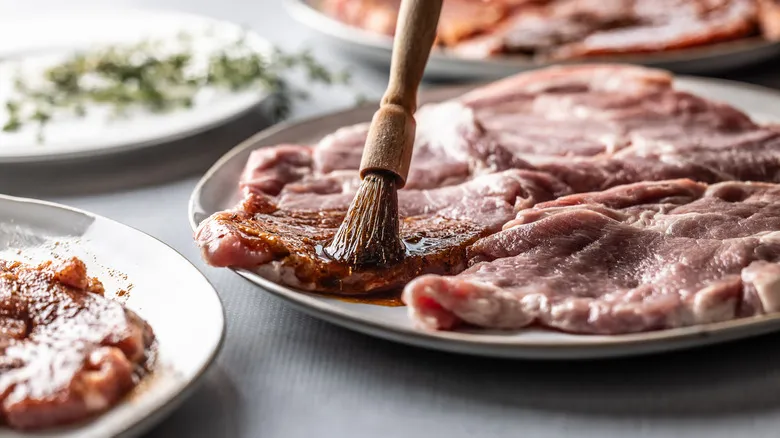A good marinade tenderizes meat

A meat marinade serves two primary functions. The first is to soften tough meat fibers, resulting in tender, melt-in-your-mouth pieces. Kantha Shelke explains that this occurs because of the acids present in marinades. "Meat marinades contain acids... that denature proteins in meat, effectively breaking down their structure, which relaxes the meat fibers and makes them more tender," she states.
To facilitate this process, your marinade should include an acidic component, such as citrus juice, vinegar, tomatoes, or yogurt. Shelke also highlights a few particularly effective ingredients. "Enzymes from fruits like papaya or pineapple, commonly used in marinades, further break down muscle fibers," she adds. These ingredients work together to tenderize tough cuts of meat, ensuring each bite is juicy and flavorful while also imparting a delightful tang to your dishes.
Properly marinating meat can elevate your recipes, but it's crucial to avoid common marinating errors that can result in dishes like salmon becoming mushy. Leaving meat and seafood in an acidic mixture for too long can lead to this undesirable texture.
Marinades add bold, delicious flavor

Enhancing the taste of meat and seafood dishes is the primary function of meat marinades. When the marinade breaks down tough muscles and fibers, it allows the meat to better absorb surrounding flavors. According to Kantha Shelke, the components of a marinade elevate the flavor of a meat dish in several ways. "The liquids in the marinade introduce moisture, which helps to plump the meat, making it more tender and allowing flavors to penetrate deeper into the meat fibers through a process known as osmosis," she explains.
This process is further supported by the presence of salt and oil in the marinade. "Salt acts as a flavor enhancer, drawing moisture out of the meat, which is then reabsorbed along with the marinade's flavors, resulting in a richer taste," Shelke notes. Regarding oil, she adds, "Oil in the marinade helps distribute the flavors of spices and herbs evenly throughout the meat." Therefore, a successful marinade should contain acid, oil, salt, spices, and other flavoring elements. By properly marinating your meat with these ingredients, you can achieve the ideal texture and flavor.
There are also numerous ways to enhance the deliciousness of marinated meat. For example, applying the technique of cooking low and slow can yield even better results when preparing particularly tough cuts of meat.
Recommended

What Is Gum Really Made Of?

What The Paper In Your Pizza Box Is And Why It's In There

Is It Safe To Drink Water With Baking Soda?

Why Is Olestra Banned In Europe But Not The US?
Next up

